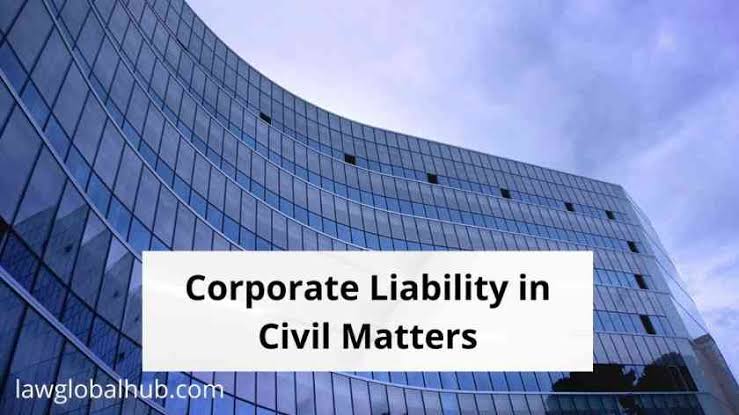N.B. This article is particular to Nigeria
Corporate Liability in Civil Matters
The liability of a corporate entity in a civil matter can be easily determined, as this is not as stringent as in criminal proceedings.
The burden of proof in a civil matter is on the basis of probability. But the guilt of an accused in a criminal proceeding must be proven beyond all reasonable doubt. ‘Private’ wrongs, are different from ‘public’ crimes.
Simply, the liabilities of a civil matter involving a corporate entity falls on the company, and not on its owners or director. In Yesufu and Another V. Kuppa International N.V ., the Supreme court held that where a director enters into a contract in the name of a company, or purporting to bind the company, it is the company, the principal, which is liable on it, not the director – the agent.
Clearly, the relationship that exists among a company, its capable official, and a third party, in the administration of contractual rights and liabilities is that of a principal, agent, and another. Wrapped in the Latin maxim, qui facit per alim facit per se – the acts of the agent (a director), within the scope of his authority, is directly that of the principal (the company). The agent cannot be held responsible for the actions which he does for the principal. The contract is essentially between the principal and the third party.
In similar vein, Tobi JCA (as he then was) in Kurubo v. Zach-Motison (Nigeria) Ltd, opined as follows:
“ In view of the fact that an artificial person or company vested with legal or juristic personality lacks the natural or physical capacity to function as a human being, those who work in it do all things for and on behalf of it…It is therefore the law and the tradition for the human beings authorized to negotiate agreement for and on behalf of the company. Where an agreement is so executed by a person in authority, the company is liable or deemed to be liable for the act or acts of the person.”
According to Section 276 of CAMA, 2020, anyone that acts for a company on the mere disguise of being its director, shall be personally liable for such unauthorized act, unless the company hold him up as being one.
Like an agent to his principal, the acts of the director that are without his scope of authority attracts personal liability. That is to say, the director of a company may become personally liable for his actions which are not within his scope of employment. He may also become personally liable if he contracted in his own name.
According to Section 94 (CAMA), a company shall be exempted from liability springing from the acts of an official or agent and a third party where there was collusion between them. Otherwise, the company will be liable, even where the act of the official or agent is fraudulent.
Notably, a company will also be exempted from civil liability where the third party had the knowledge (actual or constructive) that the general meeting, board of directors, or managing directors had no power to act in such a manner, or acted ultra vires or in an irregular manner of its powers. In other words, the law will not pat the back of a negligent third party, who knew of the unlawfulness of the actions of the directors, or should reasonably have known, as the case may be.
Again, there is no tight corner – so to speak- in liabilities of civil matters as they relate to corporate entities. It is largely a case of principal and agent relationship, with vicarious liability.


Leave a Reply